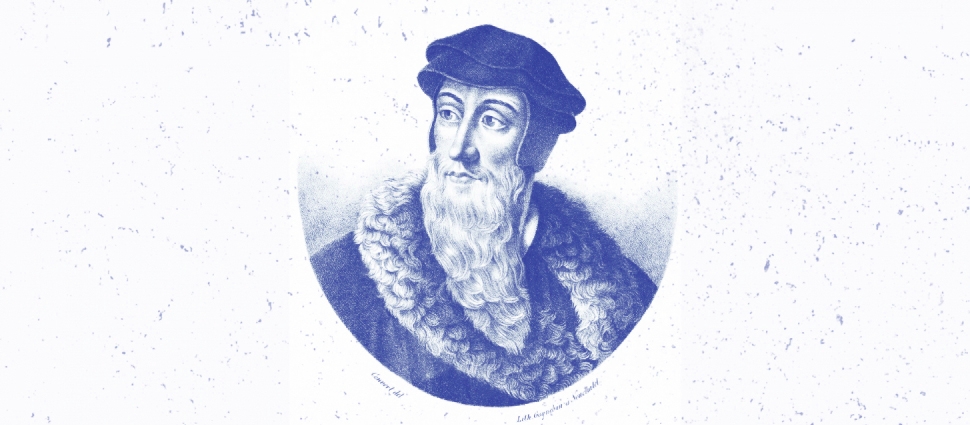In Praise of Wisdom

Some find it misguided to praise men. It was, after all, the Corinthian problem that they openly declared their allegiance to men: Apollos, Paul, or Peter. In doing so they caused major divisions in the Corinthian church.
But we are not, I think, to conclude from this that we are never to express our appreciation for the lives of men (and women!) whose gifts have helped not only their own generation but our own also. Surely, this is the meaning of the gallery of the faithful in Hebrews 11.
For my part any such gallery must include John Calvin. The opening sentence of The Institutes of the Christian Religion alone is worth a lifetime's contemplation: "Nearly all the wisdom we possess, that is to say, true and sound wisdom, consists of two parts: the knowledge of God and of ourselves."
Not everyone would agree, of course. My favorite criticism of Calvin (monstrously over-done and deliciously vitriolic) is by Will Durant, the famous author of the eleven-volume series, The History of Western Civilization:
"We shall always find it hard to love the man, John Calvin, who darkened the human soul with the most absurd and blasphemous conception of God in all the long and honored history of nonsense."
That would be enough to make anyone want to read Calvin!
What is it about Calvin that so inspires me? It is his disciplined style, his determination never to speculate, his utter submission to Bible words as God's words, his submission to Christ's Lordship, his sense of the holy, his concern to be as practical as possible. It is the fact that godly living was his aim, and not theology for the sake of it. In a forest of theologians, Calvin stands like a Californian Redwood, towering over everyone else.
I know that the word 'Calvinist' is a theological swear-word in some circles. I am convinced that folk who use the word that way have never read Calvin at all! They may have read about him; but they have not read the careful, reverential way in which he wrote. It is, of course, what Calvin said about predestination that goads certain people. But Calvin was extremely careful not to speculate here. He wrote about predestination in the same way that Paul does in Romans 8 and 9. Rather than introduce election at the very beginning of his treatment on theology (the logical place to put it), he placed it after spelling out what the Gospel is and does. Calvin talked about the free offer of the gospel first: That the Gospel is for "whosoever-will." Only after he has established this does he introduce predestination, and then in the context of re-assuring believers of their eventual glorification (in exactly the same way as Paul does at the end of Romans 8). Calvin was concerned to answer the question: Why, when the Gospel is proclaimed, do some respond and others do not? Not for Calvin the smugness and ugly exclusivism of the old Particular Baptist hymn:
We are the Lord's elected few,
Let all the rest be damned;
There's room enough in hell for you,
We won't have heaven crammed!
Calvin simply wanted to extol the marvelous grace of God, that, though he deserved damnation, God had chosen to show his love instead. He would readily agree to the perspective of John Newton:
Amazing grace! how sweet the sound,
That saved a wretch like me!
I once was lost, but now am found,
Was blind, but now I see.
Calvin saw what I suspect even those who despise him also concede in some way or another: That election—God's powerful work—provides the only hope of certainty for our salvation.
Editor's Note: This article has been adapted from the "Blogging the Institutes" series, which originally ran from 12/2008 to 12/2009. For 2020, the Alliance is offering a free, year-long reading schedule through Calvin's Institutes. You can also find a companion devotional, Zeal for Godliness, at ReformedResources.org.
Derek Thomas (PhD, University of Wales/Lampeter) is senior minister of First Presbyterian Church in Columbia, S.C., and Chancellor’s Professor of Systematic and Pastoral Theology at Reformed Theological Seminary. He also a Ligonier Ministries teaching fellow and author of numerous works, including A Voyage of Discovery.
Related Links
Calvin's Institutes: A Reading Schedule (2020)
Zeal for Godliness, edited by Derek Thomas and Carlton Wynne
John Calvin: The Man and the Preacher [ Audio Disc | MP3 Disc | Download ]
The Protestant Reformation and John Calvin [ Audio Disc | MP3 Disc | Download ]
"Worship That Smells: Calvin on Genesis 8" by Aaron Denlinger




